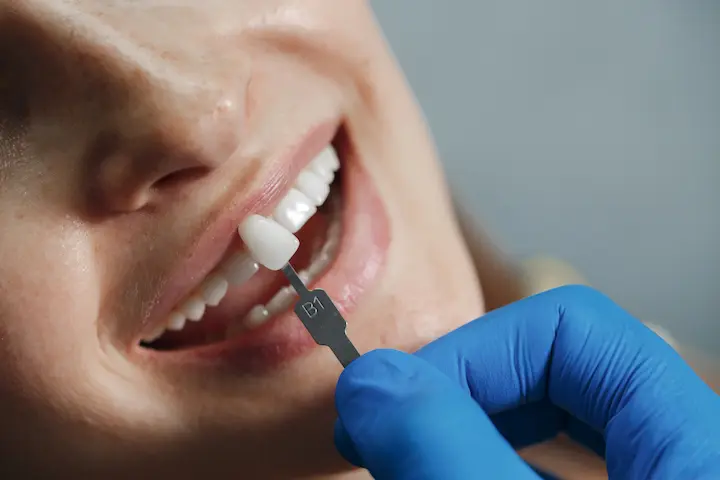What is teeth grinding? “Teeth grinding, teeth clenching or “bruxism” as it is medically known, refers to the involuntary clenching, grinding and rubbing of the teeth together. This is a condition experienced by about half of the population from time to time. About 5% of the total population grinds their teeth regularly and vigorously. While …
What is teeth grinding?
“Teeth grinding, teeth clenching or “bruxism” as it is medically known, refers to the involuntary clenching, grinding and rubbing of the teeth together. This is a condition experienced by about half of the population from time to time. About 5% of the total population grinds their teeth regularly and vigorously. While this usually occurs during sleep, some people grind their teeth even when they are awake.”
Often the person is not aware that they grind their teeth during sleep, so the partner sharing the bed (who hears the grinding sounds at night) is often the first to notice the problem. Parents may also hear similar sounds when their children are sleeping. Teeth grinding can be a result of stress; for example, some people grind their teeth when they feel angry, intense or anxious.
Symptoms of Teeth Grinding (Bruxism)
Symptoms of Teeth Grinding on Teeth
Abrasion, flattening, cracking or sensitivity: Smooth or rough wear marks on the teeth, erosion of sharp edges and loss of enamel.
Pain and sensitivity: Especially when you wake up in the morning, pain in the teeth and gums and sensitivity to cold/hot food and drinks may increase.
Symptoms of teeth grinding in the jaw joint
Pain, clicking or noises: Pain, clicking or grinding sounds can be heard in the jaw joint. There may be difficulty opening and closing the mouth.
Muscle fatigue and spasms: Stiffness, fatigue and spasms may occur in the jaw muscles.
Sleep Problems Caused by Teeth Grinding
Insomnia or daytime sleepiness: Teeth grinding can impair sleep quality, make it difficult to fall asleep or cause daytime sleepiness.
Grinding sounds that make it difficult for your partner to fall asleep: Your bed-sharing partner may hear you grinding your teeth during sleep and this can disrupt their sleep patterns too.
Other Symptoms of Teeth Grinding
Muscle tension and pain in the face: Tension in the facial muscles, pain in the ears and headache may occur.
Looseness or loss of teeth: Excessive wear and strain can lead to loose teeth and, in rare cases, tooth loss.
Bite marks on the inside of the face: When you unconsciously clench the teeth during sleep, you can bite the inside of the cheeks and create scars.
Problems Caused by Teeth Grinding (Bruxism)
Problems Caused by Teeth Grinding
Wear and Damage: The constant rubbing of the teeth against each other causes the enamel layer to wear away, causing the teeth to flatten, crack and break. This can lead to tooth sensitivity, pain and aesthetic problems.
Fracture and breakage of teeth: In extreme and severe cases of bruxism, teeth can break and even break off. This leads to permanent damage to the teeth and the need for treatment.
Problems of Teeth Grinding in the Jaw Joint
Pain and Discomfort: The jaw joint and surrounding muscles are overstrained due to bruxism, which can lead to problems such as pain, fatigue, clicking or squeaking sounds.
Jaw Joint Disorder (TMJ): Chronic bruxism can lead to degenerative changes in the jaw joint and jaw joint disorder (TMJ). This can cause difficulty in opening and closing the mouth, limitation of movement in the joint and functional problems.
Other Problems Caused by Teeth Grinding
Headache Bruxism can cause headaches, especially in the temples and around the ears.
Sleep Disorders: Teeth grinding sounds and pain in the jaw joint can disrupt sleep quality and make it difficult to fall asleep.
Facial Muscle Tension: Bruxism can cause tension and spasms in the facial muscles. This is caused by overworking of the clenching muscles and jaw muscles.
Gum Diseases: Teeth grinding can lead to gum diseases such as inflammation and bleeding of the gums.
What are the Risk Factors of Teeth Grinding?
Stress and Anxiety: Stress and anxiety are among the most common risk factors for bruxism. During periods of intense stress and anxiety, you may unconsciously clench or grind your teeth.
Structure and alignment of teeth: In some people, the structure and alignment of the teeth may predispose to bruxism. For example, conditions such as incompatibility in the jaw bite or excessive closure of the teeth can increase the risk of teeth grinding.
Sleep Disorders: Sleep disorders such as sleep apnea and snoring can increase the risk of bruxism. In these disorders, breathing problems and lack of oxygen can lead to involuntary clenching of the teeth.
Certain Medications: Some medications, such as antidepressants, antipsychotics, and some amphetamines, can cause bruxism as a side effect.
Dental Procedures: New fillings, crowns, or dentures can disrupt the alignment of teeth and lead to bruxism.
Genetic Predisposition: A family history of bruxism can increase the risk of developing this disorder.
Other Factors: Alcohol and caffeine consumption, smoking, drug use, and certain medical conditions can also increase the risk of bruxism.
How Can You Reduce the Risk of Teeth Grinding?
Here are some things you can do to reduce your risk of teeth grinding:
Manage Stress: Practice stress-reducing techniques such as yoga, meditation, and breathing exercises.
Regularize Your Sleep Hygiene: Create a regular sleep schedule, stay away from electronic devices before going to bed, and make your sleep environment comfortable.
Visit Your Dentist Regularly: Make sure your teeth and jaw are healthy. If necessary, your dentist may recommend night guards or other treatment options.
Reduce Alcohol and Caffeine Consumption: Alcohol and caffeine can trigger teeth grinding. Therefore, try to limit their consumption.
Quit Smoking: Smoking damages your teeth and gum health and increases the risk of bruxism.
Brush and Floss Your Teeth Regularly: Don’t neglect your oral hygiene. Brush and floss your teeth twice a day.
Causes of Teeth Grinding in Children:
Teething: Teeth grinding is common, especially during infancy and early childhood, when new teeth appear. The itching and discomfort caused by the teeth coming out of the gums can cause the teeth to clench involuntarily.
Stress and Anxiety: As in adults, stress and anxiety are one of the most important triggers of bruxism in children. Stressful situations such as exams, family problems, and difficulty adapting to a new environment can lead to teeth grinding.
Sleep Disorders: Sleep disorders such as sleep apnea and snoring can also increase the risk of bruxism in children. In these disorders, respiratory problems and lack of oxygen can cause the teeth to clench involuntarily.
Teeth Structure and Alignment: The structure and alignment of the teeth can predispose some children to bruxism. For example, conditions such as incompatibility in jaw closure or excessive closure of the teeth can increase the risk of teeth grinding.
Certain Medications: Medications used for certain disorders, such as attention deficit hyperactivity disorder (ADHD), can cause bruxism as a side effect. Genetic Predisposition: A family history of bruxism can increase the risk of developing this disorder in children.
Symptoms of Teeth Grinding in Children:
Teeth wear and sensitivity: Flat or rough wear marks on the teeth, wear of sharp edges and tooth enamel loss may be seen.
Pain, clicking or sounds in the jaw joint: Pain, clicking or grinding sounds may be heard in the jaw joint. Difficulty in opening and closing the mouth may be experienced.
Sleep problems: Insomnia or daytime sleepiness may be experienced.
Muscle tension and pain in the face: Tension, pain and headaches may be experienced in the facial muscles.
Bite marks on the inside of the face: When the teeth are unconsciously clenched during sleep, you may bite the inside of the cheeks and create marks.
How is Teeth Grinding Treated in Children?
Treatment for teeth grinding in children varies depending on the cause of the problem. In mild cases, the dentist may recommend dental guards. Family therapy or behavioral therapy may be useful for bruxism caused by stress and anxiety. If there is an underlying health problem such as sleep apnea, this problem should be treated first.
Recommendations for Parents:
If you notice your child grinding their teeth, consult a dentist.
Monitor your child’s stress and anxiety levels and seek professional help if necessary.
Organize your child’s sleep hygiene.
Explain the harms of teeth grinding to your child and encourage them to quit this habit.
Have your child do calming and relaxing activities.
Teeth grinding is a problem that also threatens the health of teeth and jaws in children. With early diagnosis and treatment, you can prevent this problem and protect your children’s oral and dental health.
Treatment of Teeth Grinding (Bruxism):
Treatment of teeth grinding varies depending on the cause and severity of the problem. In mild cases, the dentist may recommend non-invasive treatments such as dental protection plates or Botox injections. In more severe cases, orthodontic treatment, splint treatment or surgical intervention may be required.
Dental Protection Plates:
Dental protection plates are specially manufactured plastic or acrylic devices used to protect your teeth while you sleep at night. These plates prevent wear and damage by preventing the teeth from rubbing against each other. Dental protection plates are prepared by your dentist according to your mouth size and are generally effective in cases of mild to moderate bruxism.
Botox Injections: Botox injections can be used in cases of bruxism caused by excessive work of the jaw muscles. Botox prevents the teeth from clenching involuntarily by temporarily paralyzing the jaw muscles. This treatment is usually applied together with dental protection plates and may need to be repeated every 3-6 months.
Orthodontic Treatment: If the structure and alignment of the teeth are causing bruxism, orthodontic treatment can correct the problem by correcting the teeth. Orthodontic treatment balances the jaw closure by moving the teeth to the correct position and prevents the teeth from clenching involuntarily. Click for detailed information.
Splint Treatment: Splint treatment can be applied in more severe cases of bruxism and in cases where the teeth have been worn and damaged. Splints are specially manufactured devices that change the position of the teeth and jaw. These devices prevent the teeth from rubbing against each other and reduce the stress on the jaw joint.
Surgical Intervention: In rare cases, if bruxism has caused permanent damage to the jaw joint or does not respond to other treatments, surgical intervention may be necessary. With surgical intervention, damaged tissues in the jaw joint can be repaired or joint function can be restored. Click for detailed information.
Ways to Prevent Teeth Grinding (Bruxism):
To prevent teeth grinding – clenching, it is important to manage stress, pay attention to sleep hygiene and seek help from a dentist when necessary.
Manage Stress: Apply stress-reducing techniques such as yoga, meditation, and breathing exercises.
Regulate Your Sleep Hygiene: Create a regular sleep routine, stay away from electronic devices before going to bed and make your sleep environment comfortable.
Visit Your Dentist Regularly: Make sure your teeth and jaw are healthy. If necessary, your dentist may recommend night guards or other treatment options.
Reduce Alcohol and Caffeine Consumption: Alcohol and caffeine can trigger teeth grinding. Therefore, be careful to limit their consumption.
Quit Smoking: Smoking damages your teeth and gum health and increases the risk of bruxism.
If you have a teeth grinding or clenching problem, you can get support from our expert dentists at Maltepe Bilim Dental Clinic. Our experienced doctors can diagnose bruxism by examining your teeth and jaw in detail and create a treatment plan that is suitable for you.
Early diagnosis and treatment helps prevent permanent damage to the teeth and jaw joint.







